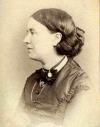Subject given—“Light and Shade.”
She stepped upon Sicilian grass,
Demeter’s daughter fresh and fair,
A child of light, a radiant lass,
And gamesome as the morning air.
The daffodils were fair to see,
They nodded lightly on the lea,
Persephone—Persephone!
Lo! one she marked of rarer growth
Than orchis or anemone;
For it the maiden left them both,
And parted from her company.
Drawn nigh she deemed it fairer still,
And stooped to gather by the rill
The daffodil, the daffodil.
What ailed the meadow that it shook?
What ailed the air of Sicily?
She wondered by the brattling brook,
And trembled with the trembling lea.
“The coal-black horses rise—they rise:
O mother, mother!” low she cries—
Persephone—Persephone!
“O light, light, light!” she cries, “farewell;
The coal-black horses wait for me.
O shade of shades, where I must dwell,
Demeter, mother, far from thee!
Ah, fated doom that I fulfil!
Ah, fateful flower beside the rill!
The daffodil, the daffodil!”
What ails her that she comes not home?
Demeter seeks her far and wide,
And gloomy-browed doth ceaseless roam
From many a morn till eventide.
“My life, immortal though it be,
Is nought,” she cries, “for want of thee,
Persephone—Persephone!
“Meadows of Enna, let the rain
No longer drop to feed your rills,
Nor dew refresh the fields again,
With all their nodding daffodils!
Fade, fade and droop, O lilied lea,
Where thou, dear heart, wert reft from me—
Persephone—Persephone!”
She reigns upon her dusky throne,
Mid shades of heroes dread to see;
Among the dead she breathes alone,
Persephone—Persephone!
Or seated on the Elysian hill
She dreams of earthly daylight still,
And murmurs of the daffodil.
A voice in Hades soundeth clear,
The shadows mourn and fill below;
It cries—“Thou Lord of Hades, hear,
And let Demeter’s daughter go.
The tender corn upon the lea
Droops in her goddess gloom when she
Cries for her lost Persephone.
“From land to land she raging flies,
The green fruit falleth in her wake,
And harvest fields beneath her eyes
To earth the grain unripened shake.
Arise, and set the maiden free;
Why should the world such sorrow dree
By reason of Persephone?”
He takes the cleft pomegranate seeds:
“Love, eat with me this parting day;”
Then bids them fetch the coal-black steeds—
“Demeter’s daughter, wouldst away?”
The gates of Hades set her free:
“She will return full soon,” saith he—
“My wife, my wife Persephone.”
Low laughs the dark king on his throne—
“I gave her of pomegranate seeds.”
Demeter’s daughter stands alone
Upon the fair Eleusian meads.
Her mother meets her. “Hail!” saith she;
“And doth our daylight dazzle thee,
My love, my child Persephone?
“What moved thee, daughter, to forsake
Thy fellow-maids that fatal morn,
And give thy dark lord power to take
Thee living to his realm forlorn?”
Her lips reply without her will,
As one addressed who slumbereth still—
“The daffodil, the daffodil!”
Her eyelids droop with light oppressed,
And sunny wafts that round her stir,
Her cheek upon her mother’s breast—
Demeter’s kisses comfort her.
Calm Queen of Hades, art thou she
Who stepped so lightly on the lea—
Persephone, Persephone?
When, in her destined course, the moon
Meets the deep shadow of this world,
And laboring on doth seem to swoon
Through awful wastes of dimness whirled—
Emerged at length, no trace hath she
Of that dark hour of destiny,
Still silvery sweet—Persephone.
The greater world may near the less,
And draw it through her weltering shade,
But not one biding trace impress
Of all the darkness that she made;
The greater soul that draweth thee
Hath left his shadow plain to see
On thy fair face, Persephone!
Demeter sighs, but sure ’tis well
The wife should love her destiny:
They part, and yet, as legends tell,
She mourns her lost Persephone;
While chant the maids of Enna still—
“O fateful flower beside the rill—
The daffodil, the daffodil!”






